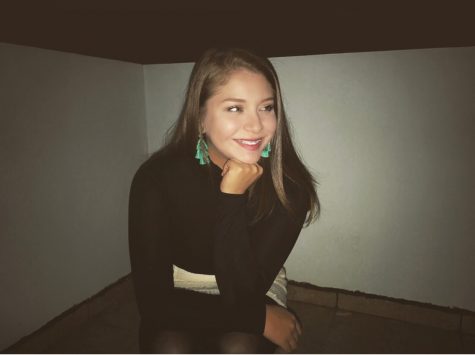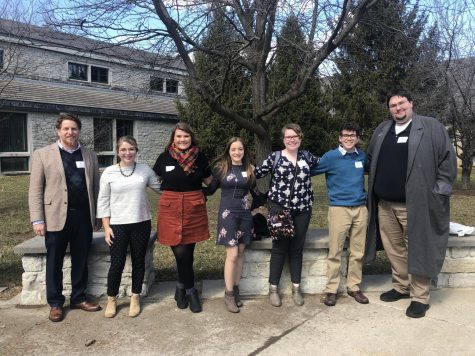English student stresses diversity through teaching research

Kennya Santiago, a junior English teaching major, focused her teaching research on inclusing diversity curriculum in the classroom.
The Shield interviewed Kennya Santiago Olmos, a junior English teaching major about her experience presenting her teaching research at the Indiana Council of Teachers of English (ICTE) 2019 conference.
The Shield: What is your research over?
Kennya Santiago: My research is over English teachers not necessarily being such sticklers about the standard English form because the history in the English language has evolved so much. If you were to look back at Old English, you wouldn’t even be able to read it because English has changed so much. So, I propose that for students to appreciate a standard form of English then we need to respect their colloquial language or their vocabulary that is yet to be recognized by the dictionary. For example, I suggested to teachers maybe do a project with your students and say, to use the word “ain’t” or “lit” and explain why “lit” would be a better adjective than a proper English word and why that word expresses what you would have to say in a paper.
The Shield: In what ways would opening doors to the “new age of lingo” work for the Diverse Curriculum?
Santiago: All we read in school is just white men and everything that they must teach us, and we forget that there is a vast history in the United States that reaches far behind what was written by historically used curriculums.
The Shield: Kind of like placing different angles and outings all in one curriculum?
Santiago: Oh 100% of that, because I do not know how we expect our students to do well if we don’t represent them in what we read and what we teach them. If there were to be a person who is involved in the LGBTQ community, why don’t we read the book “Boy Meets Boy” by David Levithan, why don’t we read “The Color Purple” to address black pride issues. Things of that nature. I just don’t know how they expect students to appreciate what we have to teach them if we don’t appreciate who they are as people.
The Shield: How did this go about? How did the Diverse Curriculum get started?
Santiago: I am an English teaching major, and we have a lot of classes that have us talk about what we want to do for our curriculum, for our units, for what we do, and they recommend books for us that we should teach. There are a lot of professors here who read books or have us read books that are very out-there. They don’t have anything to do with the books I have read such as 1984 in high school. A lot of people didn’t read in high school, and that is because the books we had to read were so white. I just wanted to give my input on it (the matter) but also back it up with research, which is why I historicized it and connected it to our history. Show through my research with English being so vast and changing so much, there is no way we can’t let it continue doing that and trying to like focus on what is going on right now instead of focusing on what could be happening later is only going to narrow our field.
The Shield: What has inspired you within the Diverse Curriculum movement?
Santiago: I am a first generation immigrant so I for a long time didn’t speak Spanish. I spoke Spanish fluently at home, but I never wanted to speak outside of the house because I didn’t want anyone to think I was stupid or couldn’t speak English. So to me it was just looking back at it, and it was all the way through high school and I was so ashamed of my culture, I was so ashamed of who I was. Now in college, I realize that I can embrace it and use that to my advantage, and it is actually really cool that I can speak both languages and experience both cultures. As a teacher, I have that kind of responsibility to my students that they can be who they are because literature proves to you that hundreds of people for hundreds of years have done them when it was too hard to be them.

Santiago presented her research with five other students at the Indiana Council of Teachers of English (ICTE) 2019 conference.
The Shield: How would you define diversity?
Santiago: I think basically anything that isn’t you or the majority is diversity, so surrounding yourself with people who have different perspectives I think is you being around diverse people. People have experienced things in life so differently, and if you don’t surround yourself with others who have different perspectives you are never going to grow as a person. To me, it is like important to be surrounded with people, even if I am around people who I don’t agree with their opinion. It is not just the color of your skin. It’s everything.
The Shield: Could you emphasize a little more of what you hope the students were to get out of the Diverse Curriculum?
Santiago: Yeah, I just hope to broaden students’ perspectives or people’s perspectives and makes them think about who they are by looking at how other people are. Finding your identity through literature and through diverse literature. Whether that be listening or reading someone’s perspective that you don’t agree with then it makes you remember “okay this is who I am and this is what I learned from this person” because no matter what you’re reading, you are learning something.
The Shield: What are the steps to a diverse curriculum, would it be just reading and conversing?
Santiago: Yeah, diverse writing. A lot of schools focus on the standardization process which they need to, unfortunately, can’t get around standardized writing and curriculums, but they forget that narrative writing is important too for students. Proving to them that if students can write narrative pieces about themselves and the world around them, they can improve their writing all around and help them with standardized testing and standardized writing too.
The Shield: Is the Diverse Curriculum a curriculum that just English professors should follow?
Santiago: I know there are professors that are huge on the diverse curriculum model, who emphasize the need to read different books and teach different books and teach different ways of thinking. I think that the diversity curriculum, the way to achieve is just learning about it by reading different books and theories.
The Shield: Is the Diverse Curriculum a movement that you are advocating?
Santiago: I would say that I am an advocate and I am just passionate about it, and whoever is wanting to talk to me about it I would love for them to talk to me about it. Especially for teachers and people who are going to be influencing our next generation of leaders, it is really important.
The Shield: Are you off campus anywhere spreading awareness to the younger generation?
Santiago: Yeah, I am an observer right now at Perry Heights Middle School, so I have little seventh graders that I interact with and they actually just recently they were talking to me and they were like “So your name is Miss Santiago right?” and I say “yeah!” and they go “that’s not a white name,” and I was like “you are right, it isn’t.” That was an opportunity for me to tell them that I was actually Mexican and I grew up in Mexico, and I blew their minds. When I told people this story they go “oh that is so rude,” and I am like “I don’t think it was, I think they were just really curious, and they wanted to know.” How would the know unless someone told them? I think that it is great. I want them to ask me questions, if they are curious then, by all means, ask me. It was really cute because there is one kid who Is typically quiet say “I am Mexican too,” and it was really sweet. It was very much a bonding moment since it is a very white school, he was like his whole world lit up. I don’t know it made me feel important for that one moment to that one person.
The Shield: What legacy do you hope to leave behind once you graduate?
Santiago: I just hope people learn to love learning. Like just never close your mind to anything, always always ask questions. I think that people have a negative mindset when it comes to questions that if you have a question go ahead and ask somebody. If they are rude then go ask someone else, ask someone who will talk to you about it. I just wrote teaching philosophy actually, and I said that one of my favorite things about myself is that I love learning. I love everything new, and I just never become complacent. Never think that you know enough because you don’t, so I hope as an RA that my residents get that I will never feel like I do enough or feel enough, and I hope that they can do the same not just for the world but for themselves as a person.
